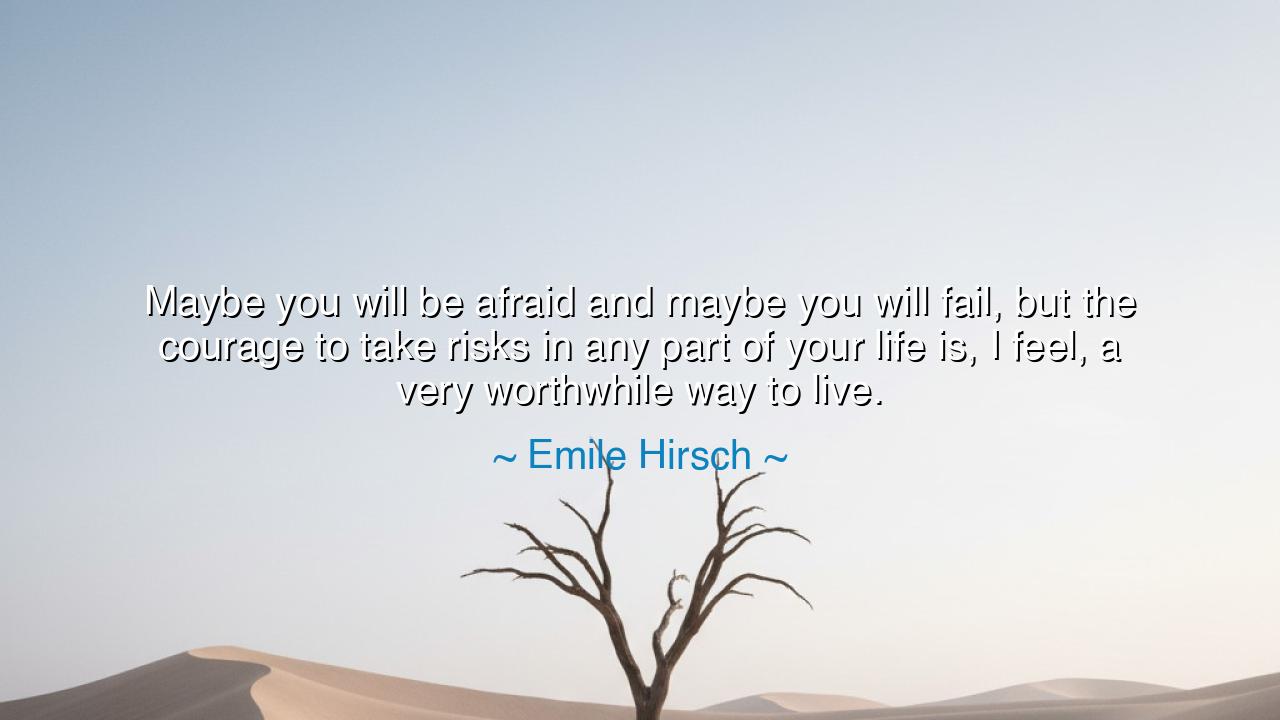
Maybe you will be afraid and maybe you will fail, but the courage
Maybe you will be afraid and maybe you will fail, but the courage to take risks in any part of your life is, I feel, a very worthwhile way to live.






“Maybe you will be afraid and maybe you will fail, but the courage to take risks in any part of your life is, I feel, a very worthwhile way to live.” — Thus spoke Emile Hirsch, the actor who once brought to life the wanderer of Into the Wild, and whose words echo the ancient cry of the human spirit: that life without courage is a life half-lived. His statement burns with humility and truth — it admits the inevitability of fear and failure, yet insists that to live fully, one must face them. For the measure of a person is not found in their triumphs alone, but in the risks they are willing to take in pursuit of meaning.
The origin of this thought lies in Hirsch’s reflection on the very essence of adventure, both physical and spiritual. In portraying real-life dreamer Christopher McCandless, who left behind comfort and certainty to test himself against the wild, Hirsch came to understand that risk is not recklessness, but devotion — devotion to the possibility of a deeper life. The ancients would have called it the courage of the soul, the readiness to step beyond the walls of habit and safety into the realm where discovery begins. For as Hirsch reminds us, fear and failure are not enemies to be defeated; they are teachers on the path of becoming.
To take risks is to affirm that life is a journey, not a fortress. Safety may preserve the body, but only courage nourishes the spirit. The one who never dares remains unchanged — untouched by the fires that shape character. In every generation, those who dared to step into uncertainty have carried the world forward. Think of Galileo, who risked condemnation for declaring that the earth moved around the sun. Think of Amelia Earhart, who flew across oceans not for fame, but to prove that courage itself could defy boundaries. Their names endure not because they avoided fear, but because they met it face to face and said, “Still, I will go.”
Hirsch’s words carry a gentler wisdom too: the acknowledgment that failure is not shameful, but sacred. To fail bravely is to have lived authentically, to have touched the frontier of one’s own potential. Failure refines the spirit as the blacksmith’s fire tempers steel. The ancients would tell us that every hero must descend before they ascend — every Odysseus must be lost before he finds his home. The person who risks nothing may never stumble, but they also never soar. And so, Hirsch calls us to live not cautiously, but worthily — to measure our days not by their ease, but by their intensity of purpose.
The heart of this wisdom is courage — not the absence of fear, but the decision to act despite it. Courage is not born in moments of peace, but in the trembling instant before the leap. It is the flame that burns in every soul that dares to grow. To live courageously, Hirsch tells us, is to honor the divine impulse within us that seeks more than survival — it seeks transcendence. For it is only by stepping beyond what we know that we encounter what we are meant to become. Fear, then, is not a barrier, but a threshold.
Yet courage is not only for explorers or heroes. Hirsch’s words speak to every human life — to the artist who risks rejection for truth, the parent who risks love despite loss, the dreamer who risks failure for beauty. Each act of risk, no matter how small, reclaims the soul from the prison of fear. The courage to speak one’s truth, to change one’s path, to forgive, to begin again — these are the quiet leaps that build a life of worth. To take risks is to participate fully in the mystery of existence, to say, “I will not watch life from afar; I will walk into it.”
So, my listener of the ages, take this teaching to heart: fear will come, and failure will follow, but let them not deter you. Let them remind you that you are alive — that you are still growing, still reaching toward the horizon. Do not wait for perfect certainty; it will never come. Leap, even trembling, and trust that the act of leaping is its own victory. For in the end, a life of cautious safety will fade into silence, but a life of courage — even one filled with struggle — will echo through time.
For this is the wisdom of Emile Hirsch’s words: that to risk is to live, and to live is to dare. The world does not remember those who hid behind their fears; it remembers those who stepped forward, afraid yet unyielding. So live as they did — boldly, vulnerably, courageously. For though the path of risk may wound you, it will also make you whole. And in that wholeness, you will find not comfort, but something far greater — the deep, enduring joy of a life truly lived.






AAdministratorAdministrator
Welcome, honored guests. Please leave a comment, we will respond soon